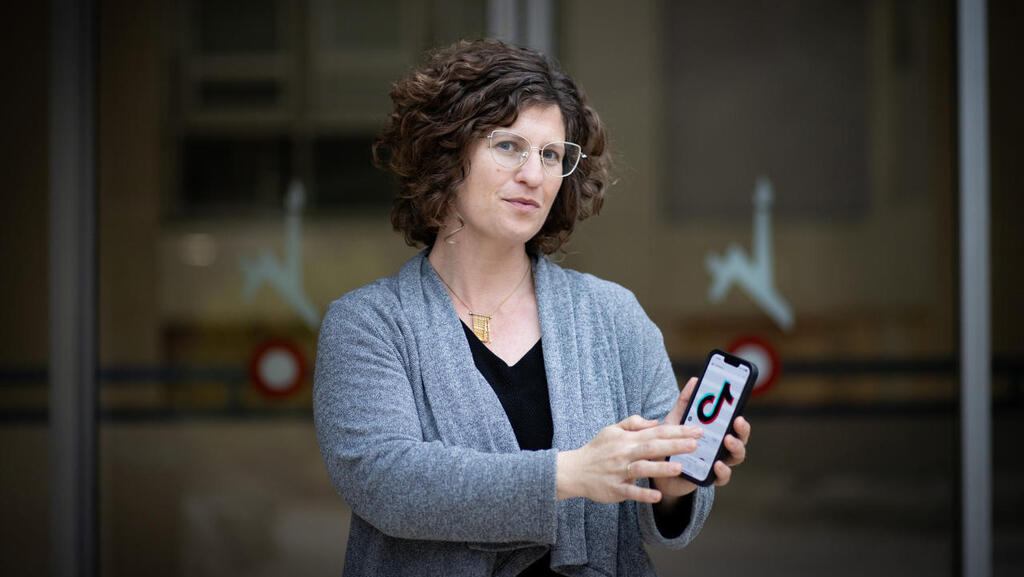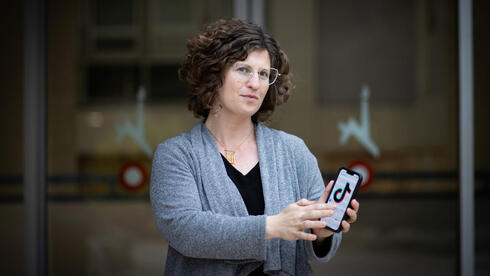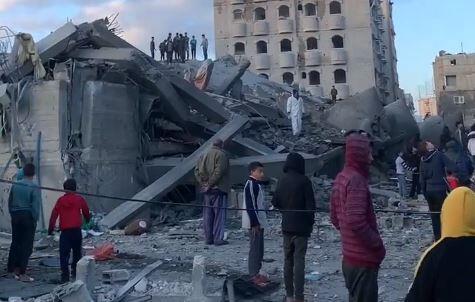
"Israel is losing the war on TikTok. Palestinians have been more active for many, many years"
"When Israelis compete about whose suffering is greater, they lose," added Dr. Lilly Boxman-Shabtai, a Hebrew University researcher of digital culture who has examined how the Israeli-Palestinian conflict is represented on TikTok
In the realm of digital diplomacy, TikTok has emerged as a battleground for shaping narratives amid the Israeli-Palestinian conflict. Dr. Lilly Boxman-Shabtai of Hebrew University, who studies platform use during the warreveals a stark reality: Israel is losing ground on TikTok. The platform's unique blend of visual storytelling and grassroots advocacy has favored Palestinian voices, presenting raw experiences that resonate globally. While Israelis grapple with traditional rhetoric, Palestinians master TikTok's nuanced language, intertwining narratives with international solidarity movements. As geopolitical tensions play out in 20-second videos, the question arises: Can Israel catch up in this digital arena?
Dr. Lilly Boxman-Shabtai from the Department of Communication & Journalism at the Hebrew University, you have been researching for years the use of TikTok as part of the Israeli-Palestinian conflict. The war in Gaza has been going on for four months, is Israel losing on TikTok?
‘Yes.”
Your answer was very decisive.
"TikTok is a revolutionary platform when it comes to civic diplomacy - where private individuals use social networks to promote a positive image of their country, all from their personal profile and voluntarily manner. Until TikTok, civil diplomacy on platforms like Facebook or Twitter was quite similar to institutional diplomacy. In both cases the message was essentially an attempt to persuade: blame the other side and highlight your side's victims; delegitimize the enemy and legitimize your group.
"On TikTok, this is one type of message, but not an exclusive one. Many times they will not try to convince with a logical argument, but will present or illustrate an experience, express a perception about truth and authenticity and create a sense of affinity with audiences and communities external to the conflict. The Palestinians manage to combine persuasion, illustration, authenticity, and relatability much more than the Israelis. For example, they will simply place the camera on the street and show the ruins and the suffering and ask the world to 'share the truth.' The Israeli side tries to convince, and does not understand that persuasion does not work. That is, the logical, rational message, the idea that we will just explain and be understood - it does not work. Another thing that the Palestinians have done very well is to create a bond with other audiences, with other minority groups that feel similar pains through intertextuality."
What do you mean by intertextuality?
"It means quoting one text in another text. TikTok's technological and cultural logic is aimed at this. There are complex editing capabilities like Duet or Stitch that allow you to combine a video with another video. In addition, the culture of the platform is such that imitations and trends are strong there: For example, a soundtrack with a certain choreography will become a trend, and different users will upload their own versions with the same soundtrack. Finally, a strategic use of hashtags that increases the exposure of a message to additional circles. For example, take the hashtag used by the other party and embed it in your video. Let's say add to a pro-Palestinian video the hashtag #israelunderattack, which will cause this content to float in the feed of the Israelis and increase exposure."
It sounds sophisticated but the content on TikTok is more superficial than on Facebook or Twitter.
"I don't think TikTok is more superficial, it's true that many times at the level of argument, in terms of logic, information and facts, a 300-word post on Facebook can convey more content than a 20-second TikTok video. But to understand the video in depth, you need to have a lot of resources and make a lot of connections. The use of elements such as a soundtrack, a trend or a hashtag creates depth. And not everyone will understand it in the same way."
Is this why adults say "I was on TikTok and I didn't understand anything"?
"Exactly. Very short videos compress a lot of information in different channels of sound, image and text. They may not say much on a rhetorical level, but the contexts can throw you into all kinds of content worlds. This is what is difficult for many to understand on this platform. The arguments may not be deep, but the layers of emotion are, and those who don't know how to decipher all the contexts don't get the full experience and will therefore have a hard time connecting to it."
So what do the Palestinians do there better than Israelis?
"In Operation Guardian of the Walls in 2021, pro-Palestinian users combined all kinds of aspects of intertextuality to create an affinity with the Black Lives Matter struggle. For example, they used the hashtag #blacklivesmatter or embedded a quote like 'we can't breathe since 1948' — which merged between the traumas of the two groups. Another practice that created uniformity in the message of the struggles was the use of a song called Stand Up, from the movie about Harriet Tubman, which talks about the emancipation of African Americans, about achieving freedom, redemption and liberation from enslavement. By using this soundtrack, Palestinians created an affinity between two different groups and protests. These tools are effective and the pro-Palestinian side uses it in a continuous and systematic way. When October 7th happened, there was already an infrastructure there.”
Does this mean that the Palestinians mobilized public opinion on TikTok already during Operation Guardian of the Walls?
"Absolutely. From what I can tell, this is not a contingency plan that was implemented during the war, but rather ongoing work. The Palestinians have been more active on TikTok for many, many years and work well with the platform. The Israelis understand this and they are closing the gap - but it is still large."
Related articles:
"The sides argue about who is more authentic"
Why isn't it working for the Israeli creators?
"Similar to the general media, in Israel we see and suffer what is happening to us and we are not so exposed to the pain of the other side. When we try to express our pain, it is impossible to disconnect the comparison. That is, the comparison simply does not work for those who are on the outside and see the devastation and destruction and the death in Gaza, and then you see what is happening in Israel. When Israelis compete about whose suffering is greater, they lose. In addition, Israeli creators often use cultural content that is not recognized on a global level or does not have the same cultural resonance - for example, the use of Israeli songs. And when an Israeli soldier used the Stand Up soundtrack she received a lot of criticism from pro-Palestinians for the 'wrong' use of the quote."
So Israelis are just not as good at Tiktok?
"I think that during the time of Operation Guardian of the Walls, Israelis understood the tool less. Today they are more successful, but are still behind."
One of the ongoing trends in TikTok is advocacy while putting on makeup, what is the secret of the trend's appeal?
"This is part of the everyday language of the platform, which enters your bedroom. The platform has a longing for the authentic. You can also argue about what is authentic, but the idea is of raw, everyday material without too much thought in which the 'behind the scenes' are revealed. Authenticity is also the connection to myself and also the loyalty to the truth. The two sides are constantly arguing about authenticity, everyone thinks that the other side is lying and that the truth is being manipulated."
If authenticity is so important in TikTok, are we doomed to lose the TikTok propaganda war?
"Look, I started with an emphatic 'yes' on the question of the Palestinian victory in the Tiktok image war. In the research I did with Prof. Moran Yarchi, we found that pro-Palestinian content gets a lot more views, likes, shares and comments, even when taking into account the higher number of followers on the pro-Palestinian side. But if we put aside the debate about the reason behind these gaps - are there more pro-Palestinian users on the platform as TikTok claims; Or is the platform promoting pro-Palestinian content in its algorithm, as its critics claim - one should ask what does winning the war on TikTok even mean?"
And what is the answer?
"Does the influence of the Palestinian side in TikTok translate into policy? Does it influence the opinions of elites and decision-makers? I don't think so. And in general, we should remember that TikTok, and any social network for that matter, is far from faithfully representing 'public opinion', even though it has a huge cultural influence. And we should also ask what our TikTok victory looks like? Is the goal to be a mouthpiece for Israel? To reduce anti-Semitism? To increase exposure to pro-Israeli content? I don’t think that Israel doesn’t have a chance to succeed at this, or that the Israelis have no ability to be authentic, but in order to be authentic and to produce a message that wide audiences in the world can identify with, we have to go beyond the limits of our personal pain. There are Israeli creators who know how to do this, who understand TikTok and use it very effectively, they're simply not the majority."

